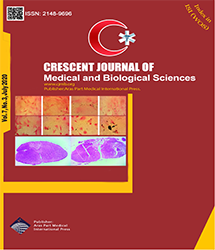
| Review | |
| Approach to "Belching Disorder": A Review of Avicenna"s Point of View in Comparison With Modern Medicine | |
| Mahshid Chaichi-Raghimi1,2, Morteza Mojahedi3,4, Ebrahim Khadem5, Seiedamirhossein Latifi6, Abbas Alipour7, Reza Ilkhani1 | |
| 1Department of Traditional Medicine, School of Traditional Medicine, Shahid Beheshti University of Medical Sciences, Tehran, Iran 2Student Research Committee, School of Traditional Medicine, Shahid Beheshti University of Medical Sciences, Tehran, Iran 3Traditional Medicine and History of Medical Sciences Research Center, Health Research Institute, Babol University of Medical Sciences, Babol, Iran 4Department of History of Medical Sciences, School of Persian Medicine, Babol University of Medical Sciences, Babol, Iran 5Department of Traditional Medicine, School of Traditional Medicine, Tehran University of Medical Sciences, Tehran, Iran 6Department of Traditional Medicine, School of Traditional Medicine, Arak University of Medical Sciences, Arak, Iran. 7Thalassemia Research Center, Mazandaran University of Medical Sciences, Sari, Iran |
|
|
CJMB 2020; 7: 299-306 Viewed : 7043 times Downloaded : 4976 times. Keywords : Belching, Eructation, Iranian traditional medicine, Persian medicine, Avicenna |
|
| Full Text(PDF) | Related Articles | |
| Abstract | |
Objectives: Excessive belching is a common complaint that may be observed alone or with other diseases such as indigestion and reflux. In addition, it has adverse effects on patients" social life. Due to the insufficient evidence regarding the successful treatment of this disorder, the present study reviewed the medical views of Avicenna in order to find a better solution in this regard. Methods: This literature review was done by searching for "belching" and its MeSH heading term, namely, "eructation" in databases such as Google scholar and Pub Med and their synonyms in Iranian traditional medicine "Josha" in Avicenna"s "Canon of Medicine". Results: The definition of belching in modern medicine was the same as "Josha" but its classifications and treatments were different. Modern scientists have divided excessive belching into gastric and supragastric based on its source although Avicenna classified it into three kinds based on its smell. In recent studies, specialists have come to a link between the brain and the stomach due to the inadequacy of their therapies while Avicenna has along pointed out the relationship between belching and certain organs. He further recommended three main approaches for its treatment, including lifestyle modification, herbal medicines, and physical manipulations. Conclusions: In general, considering the lack of effective treatment for excessive belching, it is important to present a better classification and management. This might be possible with regard to Avicenna"s "Canon of Medicine". Thus, clinical trials are suggested to assess the efficacy of Avicenna"s recommendations as a complementary method. |
Cite By, Google Scholar
Google Scholar
PubMed
Online Submission System
 CJMB ENDNOTE ® Style
CJMB ENDNOTE ® Style
 Tutorials
Tutorials
 Publication Charge
Medical and Biological Research Center
About Journal
Publication Charge
Medical and Biological Research Center
About Journal
Aras Part Medical International Press Editor-in-Chief
Arash Khaki
Deputy Editor
Zafer Akan


















